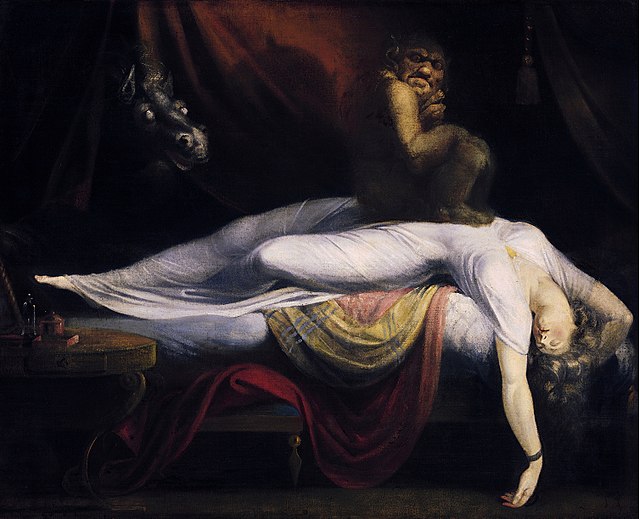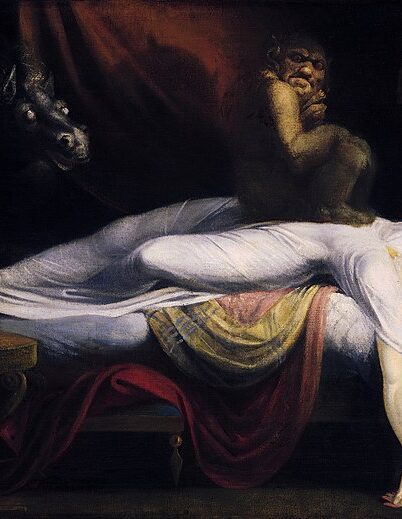 There are times when we will be called out to look into frightening accounts of regular, nightly torment from unknown, possibly demonic entities.
There are times when we will be called out to look into frightening accounts of regular, nightly torment from unknown, possibly demonic entities.
These people seem genuinely scared, fragile and confused. They are often apprehensive about coming forward and making contact, and they fear ridicule from those who might not be aware of, or even understand their situation.
As a researcher and investigator, it is imperative that I am aware of the various alternative explanations to any apparent paranormal experience. A person’s physical wellbeing, as well as mental state, can also be a telling factor in your decision as to whether someone is having a natural or unnatural episode.
Sleep disorders, for example, can cause a myriad of symptoms that could quite easily be mistaken for an occurrence of possible paranormal nature.
Sleep paralysis is quite well known in the general populace, though unfortunately, within the paranormal community, there are many who are easily lead to believe it is a form of demonic attack, whilst a person is sleeping, by spirits or malevolent demons. This is typically due to a lack of education on the subject, naivety and religious bias.
Just why or how it happens isn’t clear.
One hypothesis is that sleep paralysis is caused by a disturbed Rapid Eye Movement (REM) cycle, because it mostly happens as people are falling into or coming out of REM sleep. During that stage, the brain normally dulls the muscles, so a person doesn’t act out during a dream. But during sleep paralysis, the sleeper is awake, or half awake, and so is aware he or she cannot move. It can lead to many forms of intense hallucination, emotion, and sometimes an overwhelming, terrifying sense of fear and panic.
Some might see a shadow man standing at the foot of the bed or in a dark corner; experience the feeling of helplessness by a visit from an Incubus or Succubus, an alien entity or abduction, or an intense fear of an unknown and unseen presence in the room. With a rise in heart rate, sufferers can also experience a sense of pressure on the chest, making breathing an uncomfortable effort. The trauma caused by the inability to breathe could explain why a lot of sufferers hallucinate an “old hag”, creature or entity sitting on their chest or choking them, restricting breathing.
Many have described a buzzing noise that can be heard as a hum of a spaceship, a growl of something “evil,” or even screaming or laughing. This is thought to be a side effect of the mental imagery, an auditory hallucination of sorts. Sleep paralysis can sometimes be a symptom of narcolepsy. This is a relatively rare sleep disorder, which causes severe disruption to the sleep-wake cycle. An inability to stay awake for more than three or four hours is usually the main symptom.
Other things that increase your risk of getting sleep paralysis include: sleep deprivation, irregular sleeping patterns, and age (it seems to be more common in teenagers and young adults, though can also affect those older).
As investigators, we have a duty to have the correct answers on hand – and if necessary, be able to make suggestions on what should or could be done to help such matters. We must learn about the possible health “glitches,” or sleep and mental disorders that might explain such traumatic experiences. If the case at hand looks to be heading into obvious mental -health or sleep-issue territory, the most responsible and ethical thing an investigator can advise is going to see a doctor or sleep specialist. The last, and worst thing any investigator should be doing is reinforcing any ghost or demon fears that the client may be already suffering. Ninety-nine-point something percent of the time, it isn’t demons and can be cured quite easily with the correct help. It’s about being honest and open.
If you don’t know the answers, don’t make shit up! You should comfort them and explain that you indeed believe what is happening to them. This is important. It’s also important to explain
how common these occurrences are. An understanding, empathic stance, letting them know they aren’t alone in their experiences, usually aids in calming and reassuring the client.
Many believe they are alone in all this. That they are the only ones experiencing such night terrors.
We must also explain the possibility that what they are experiencing could possibly have natural explanations that can easily be perceived as a paranormal experience. It is best not to go into an investigation of this kind with any preconceived notions that this is an evil demon attacking the client. Any talk of even the possibility should be left out entirely, as talk of demons and negative energies will only work to solidify the idea in the mind of the sufferer, potentially making the situation much worse. It is a responsible move to explain to them that the possibility of this being a paranormal experience is extremely remote, and to refer them back to their family doctor as soon as possible. Unless you are a mental health professional, or a registered doctor yourself, please do not attempt any diagnosis, as chances are you might be incorrect in your assumptions, possibly leading to an unfortunate and regrettable consequence as a result.
Check the bedroom for any signs of high EMF levels, which might also be the cause for the activity. It is a well-known fact that high EMF at a close range can sometimes cause hallucinations, dizziness, paranoia and feelings of unease. Many digital alarm clocks situated beside the bed have been noted as having unsafe EMF levels. An act as simple as moving the bed to another part of the room could solve some situations if EMF is a contributing factor to a lack of sleep.
In my time, I’ve helped a few families cope and come to grips with their traumatic night experiences. Often time it is indeed a simple case of a sleep disorder. I can make the suggestion that they contact a sleep specialist or better still, ask them to Google it first. Have them read up on the subject for themselves; if they have a computer handy, or you’ve brought a laptop or tablet device along, jump in and bring it up yourself to show them. See if they feel it fits their situation.
Reading the explanations for themselves can often help and heal the situation by itself.
Sometimes, a full-scale paranormal investigation is simply not necessary, as the case could end up being something quite simple.
The main thing to remember is to stay cool, think rationally and sensibly and to be honest and truthful.
Don’t offer advice unless you are totally sure the information you are giving is correct.
Don’t try to be the know-it-all expert.
Offer alternatives: website articles to look at and sleep specialist contact details.
As a researcher and investigator, know your shit first. Educate yourself.
Leave any religious biases at the door.
Be ethical, sensitive and practically minded, or don’t take on the case at all. The risk can sometimes be too great

